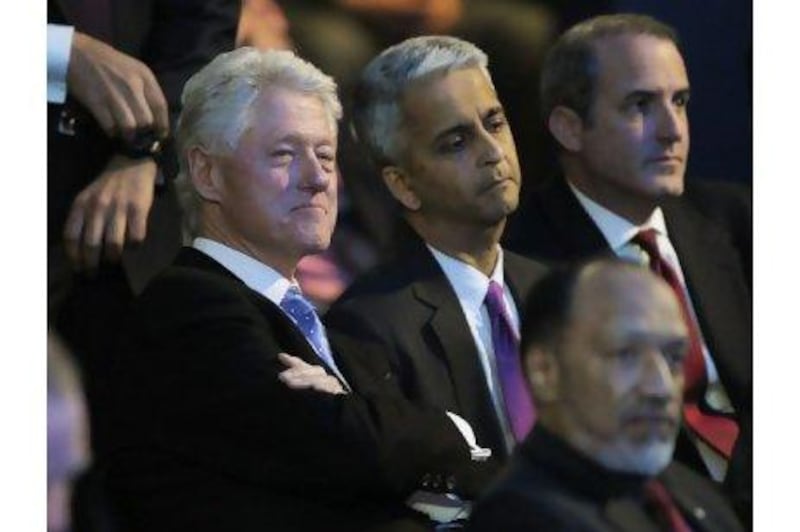From Uncle Sam's perspective, Fifa awarding the 2022 World Cup to Qatar last week in Zurich was suspiciously familiar to the perceived snub last year by the International Olympic Committee (IOC).
Factor in the IOC siding with London over New York for the 2012 Summer Games, and Americans can be forgiven for developing a complex.
Why such antipathy toward them? Or is it shady back-room dealings by others?
The United States bid proposal was regarded by most neutral observers as the soundest of all the candidates'.
The US organising committee promised five million tickets sold and US$1 billion (Dh3.72bn) in revenue, far exceeding any other bidder. Stadiums, roads, hotels - everything was already brick-and-mortar, not on some architect's drawing board. Television ratings? Through the roof.
Despite a knock-your-socks-off bid package and pre-vote presentations by Bill Clinton, the former president, and Morgan Freeman, the Oscar-winning actor, the US were beaten by Qatar, mustering just three votes.
At least America reached the final round this time. Chicago was the first of four cities dismissed by the Olympics delegates for the 2016 Summer Games.
In retrospect, it was no shock that the Olympic door was slammed in the United States' face. Its committee is engaged in a financial dispute with the IOC. And the IOC's preference that the government offer, at minimum, a monetary backstop for the host city runs counter to prevailing American sentiment that no public funds be devoted to fun and games.
With the World Cup, the US scored higher on technical specifications in most categories than Qatar, which must erect several arenas and figure out how to transport spectators to them.
And while the locals may be accustomed to temperatures that exceed 40°C in July, guests from other countries may be heading home by the time they become acclimatised.
On the American side of the globe, it is customary to cry foul when a decision by an international body does not go our way. News of the Fifa vote triggered calls for an investigation by some media and football supporters.
That is understandable, sort of. The US became spoiled when its bigger-is-better bid philosophy brought four Olympic Games (two summer, two winter) and a World Cup between 1980 and 2002.
Somewhere along the way, the IOC and Fifa members began handing out host roles for new reasons, mainly to spread the wealth. Beijing won the 2008 Summer Games partly to prod China, a first-time host, to continue coming out of its communist shell and embrace more open governance. Rio de Janeiro (2016) was rewarded for its burgeoning capitalism - and South America for its patience in never having held an Olympics.
In Fifa's case, South Africa was blessed with last year's World Cup as further encouragement to shed its legacy of racial repression. And the African continent had yet to welcome the tournament.
As for Qatar, who can blame Fifa for wishing to better expose the sport to the Muslim world? Maybe it was as simple as Fifa president Sepp Blatter's statement early this year that "The Arabic world deserves a World Cup".
The tiny nation's bid was impressive, even if its concept of open, air-conditioned stadiums seems energy inefficient to a Western world increasingly aware of such issues.
Still, Fifa must alter the way it does business.
It expects glossy bid books with hundred of pages filled with evidence why the submitting cities should be considered. It advises those cities on how they should ramp up to become host-worthy. It dispatches inspectors to evaluate on-site the merits of their proposal.
The US played the game. Just as $50 million was spent over three years in the latest Summer Olympics quest, its football federation went through untold millions of dollars in a two-year period, only to discover that Fifa was applying another set of rules.
It is time for Fifa to discourage the wasting of funds that could be directed, say, toward developing youth football, especially in years when it dishes out the World Cup to a region that has been deprived of it, or when it falls back on sentimental reasons.
In turn, US bid groups must stop relying entirely on cold, hard facts and display what Atlantans called "southern hospitality" when their city was deemed a long shot locale for the 1996 Summer Olympics.
Organisers set up an "Atlanta House" in whatever town IOC delegates visited, then plied them with charm, along with food and drink that represented the area. The idea was to convey the heart and soul of the region, not just the infrastructure and the funding.
Some years, perhaps the game cannot be won. In others, there is more than one way to play it.





